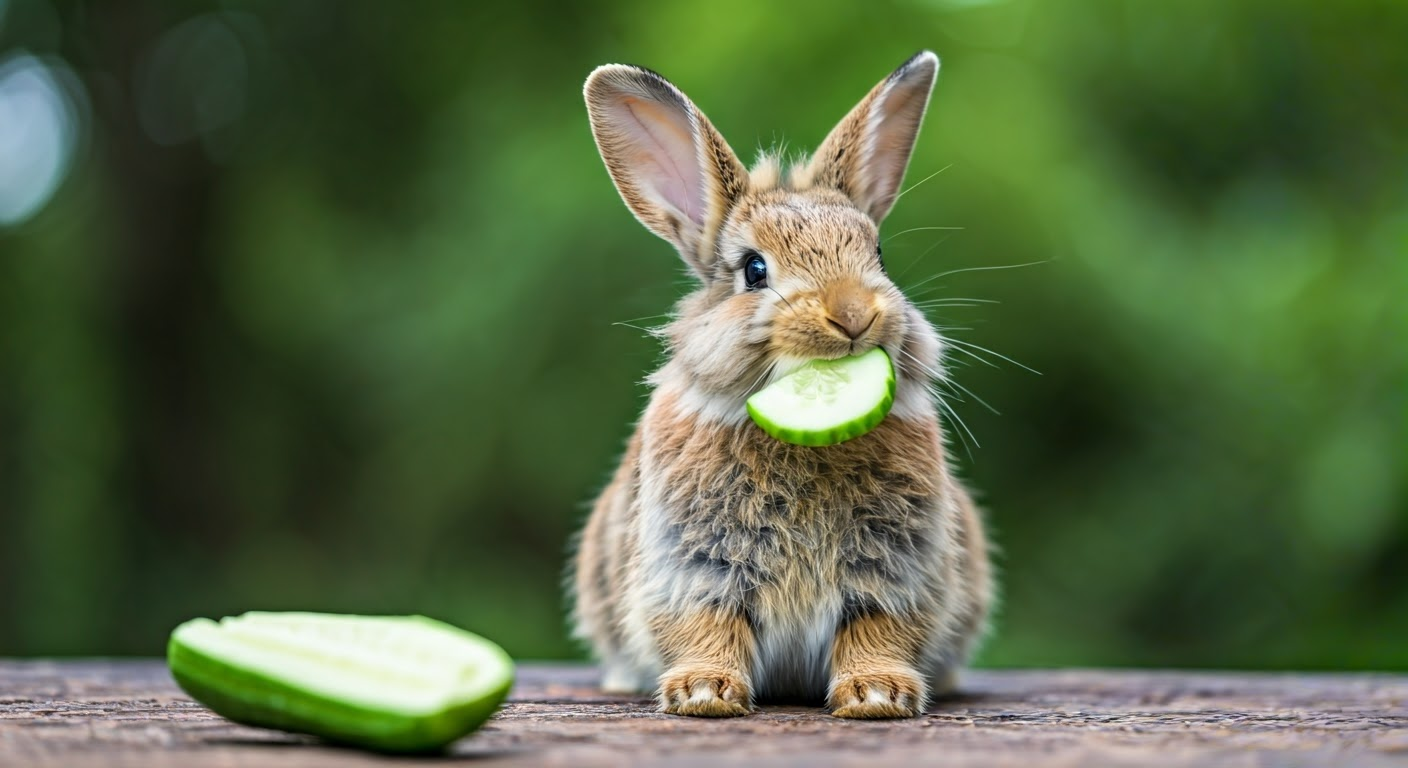Key Highlights
- Good news, bunny parents! Cucumbers, when given in moderation, are safe and healthy for your furry friends.
- These yummy veggies have a lot of water. They can help keep your rabbit hydrated, especially in hot weather.
- Cucumbers have small amounts of vitamins and minerals. They include vitamins K and C, which are good for a balanced rabbit diet.
- Always make sure hay is the main part of your rabbit’s diet. After hay, give leafy greens and only a limited number of pellets.
- Remember to slowly add cucumbers to their diet. Watch for any signs of digestive upset in your rabbit.
Taking care of a pet rabbit means understanding that they need more than just carrots. A rabbit’s diet should mainly include hay. Fresh vegetables are also important for a healthy and balanced diet. Many pet owners like to give their rabbits cucumbers. This is because cucumbers have a high water content and taste good. But can rabbits eat cucumbers safely? What are the pros and cons of giving them cucumbers?
Understanding the Rabbit Diet
A rabbit’s stomach works best when it has a lot of fiber and not much starch. Their main food should always be fresh hay like timothy, meadow, or oat hay. Hay gives rabbits the fiber they need. It also helps their teeth wear down and keeps their digestion healthy. Rabbits can also enjoy treats like strawberries sometimes. If your rabbit seems unwell, it is important to see a vet.
In addition to hay, adult rabbits also need a mix of leafy greens that contain a lot of calcium. You should always have fresh water available. This helps keep your rabbit hydrated throughout the day.
Essential Nutrients for Rabbits
Rabbits require a good mix of nutrients and proper nutrition to grow healthy. Hay is the main part of their diet. It provides essential fiber and nutrients. Vitamin C is important for keeping their immune system and health strong. You can find Vitamin C in leafy greens such as parsley, cilantro, and kale.
A good diet for your bunny should include a small amount of pellets made just for rabbits. These pellets add important vitamins and minerals. This helps your bunny have a balanced diet.
Always talk to your veterinarian. They can help you pick the best pellets and tell you how much to feed. They will consider your rabbit’s age, breed, and health.
How Cucumbers Fit into a Rabbit’s Diet
Cucumbers have high water content, so they are a tasty treat for rabbits in hot weather. However, it’s important to give cucumbers in moderation. Use them only as a snack and cut them into small pieces. Make sure to also provide their regular meals, which should include hay, pellets, and other fresh vegetables.
If cucumbers are a new food for your rabbit, you should add them to their diet slowly. Begin with small amounts of cucumber, like a tiny piece. Then, keep an eye on their droppings. Look for any signs of digestive upset, such as diarrhea or soft stools.
If you notice any bad reactions, stop giving cucumbers immediately. Then, contact your veterinarian.
Benefits of Cucumbers for Rabbits

Cucumbers taste great and are good for rabbits’ health if you give them in moderation. They have high water content, which helps keep rabbits hydrated. This is important because rabbits can get dehydrated very easily.
Cucumbers may not have as many nutrients as some other vegetables. However, they do offer small amounts of vitamin C, potassium, and magnesium. These nutrients can help provide a balanced diet for rabbits.
Hydration and Nutritional Content
Cucumbers are made up of about 96% water. This makes them a good choice for keeping your rabbit hydrated. Proper hydration is very important for your rabbit’s health. It helps with digestion, regulates body temperature, and supports organ function.
Cucumbers are not rich in vitamins and minerals, but they do contain some vitamin C. This vitamin is important for your rabbit’s immune system. It helps keep them healthy and prevents scurvy.
Cucumbers provide some potassium. Potassium is important for muscle function and helps balance fluids in the body.
The Role of Cucumbers in Dental Health
The crunchiness of cucumbers helps keep your rabbit’s teeth healthy. When rabbits chew on crunchy foods, such as cucumbers, it helps to wear down their teeth. Rabbit teeth never stop growing, so it’s important to keep them trimmed.
If their teeth grow too long, it can cause problems like malocclusion. This makes it hard for your rabbit to eat well. Giving cucumbers in small pieces allows them to enjoy the crunch safely, without the risk of choking.
- Always keep an eye on your rabbit when you give them new food.
- Make sure they can chew and swallow it easily.
Precautions When Feeding Cucumbers to Rabbits

Cucumbers make a good snack. However, you should be careful about how many you eat. If you eat too many, you might feel sick to your stomach, like having diarrhea. This can happen because cucumbers have high water content and less fiber compared to other vegetables.
You should think about pesticides too. Cucumbers, like many fruits and vegetables, usually have pesticides on them. These can be bad for rabbits.
Portion Control and Frequency
When you give cucumbers to your rabbit, do it carefully. Start with just a small piece, like a thin slice of cucumber. If your rabbit enjoys it and seems fine, you can slowly increase the amount. A good rule is to give no more than two slices of cucumber a few times each week. Remember, hay should stay the primary food source for your rabbit.
Cucumbers are a nice snack for your rabbit, but they should not take the place of their main food. You should always give your rabbit fresh hay without limits. Offer a limited number of pellets and some fresh vegetables too.
Keep an eye on your rabbit’s droppings when you give them new food. If their poop changes in appearance, reduce the amount of cucumber or stop giving it altogether.
Potential Risks and How to Mitigate Them
Feeding cucumbers to rabbits can be safe, but you should be careful. When trying a new food, there is a chance they may have an allergic reaction. Therefore, it’s good to give cucumbers slowly and pay attention to any signs of allergy. Also, avoid giving your rabbit very small amounts of cucumber all at once. Watch for signs like lethargy, tiredness, digestive upset, or skin issues.
Another problem is pesticides and heavy metals. You can reduce this risk by picking organic cucumbers. Also, make sure to wash cucumbers thoroughly under running water before you eat them. This can help remove any germs on the surface.
Here is a quick reference table:
|
Potential Risk |
Mitigation Strategy |
|
Pesticide Exposure |
Choose organic, wash thoroughly |
|
Heavy Metals |
Choose organic, wash thoroughly |
|
Digestive Upset |
Introduce gradually, moderate portions |
|
Allergies |
Introduce slowly, monitor for reactions |
Always contact your veterinarian if you have any concerns or notice bad reactions after you give cucumbers to your rabbit.
Conclusion
In short, it’s very important to know what your rabbit should eat for good health. Cucumbers can be a nice treat. They have a lot of water and some health benefits. But remember, give them in moderation. Too much cucumber can cause digestive issues, especially if they are eaten in excess. Always focus on a balanced diet that includes hay, fresh vegetables, and only a few fruits. This helps keep your rabbit healthy and happy. If you have more questions about your rabbit’s diet or care, check our FAQs section for more help.
Frequently Asked Questions
How Often Can Rabbits Eat Cucumbers?
- Offer cucumbers in moderation.
- Give only a few slices, about two to three times a week.
- Balance is key.
- Make sure cucumbers help with the main diet.
- The diet should include hay, fresh vegetables, and a limited number of pellets.
- This practice helps avoid obesity and digestive issues.
Can Rabbits Eat Cucumber Peels?
Yes, rabbits can eat cucumber peels. The peels have a lot of fiber that helps with their digestion. In addition, rabbits can have cucumber plants and leaves, but only in moderation. It is important to wash cucumbers well to remove pesticides. You might also want to choose organic cucumbers.
Are Cucumbers Safe for All Rabbit Breeds?
Cucumbers and pickles are usually safe for rabbits. This includes cucumber leaves. Yet, different rabbit breeds may digest food a bit differently. If you are worried about a certain breed or allergies, it’s best to ask your veterinarian. Also, remember to practice moderation when giving any new food to your rabbits.
What Other Vegetables Are Safe for Rabbits?
Rabbits can enjoy many fresh vegetables. They like cabbage, broccoli, and cucumbers. They also love romaine lettuce, bok choy, coriander, parsley, and bell peppers without seeds. It’s important to give them a variety of leafy greens and vegetables. This way, you can help them have a balanced diet.

Hi, I’m Sondip,
I’m a writer who loves to help people solve their problems. I write about small animals like mice and other small animals and even pests.

